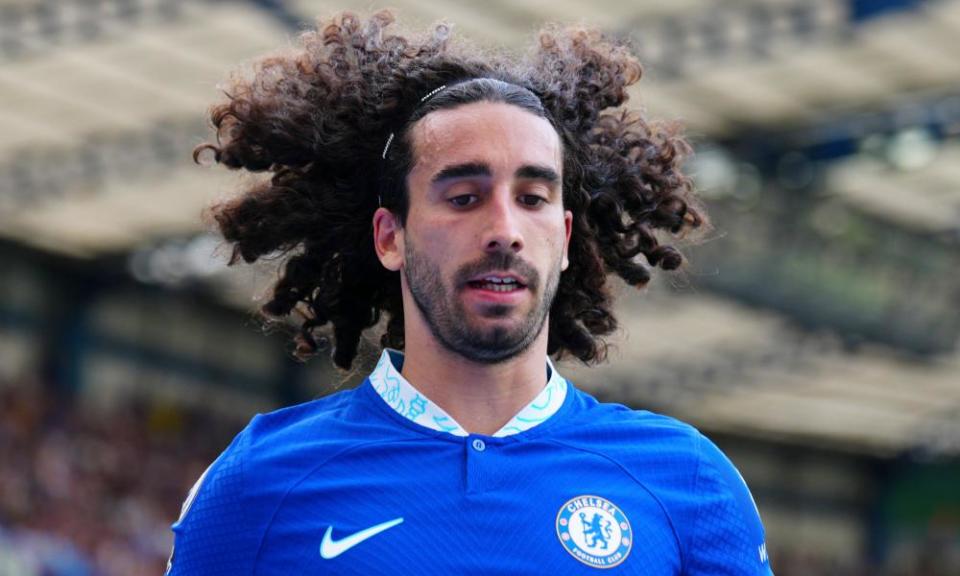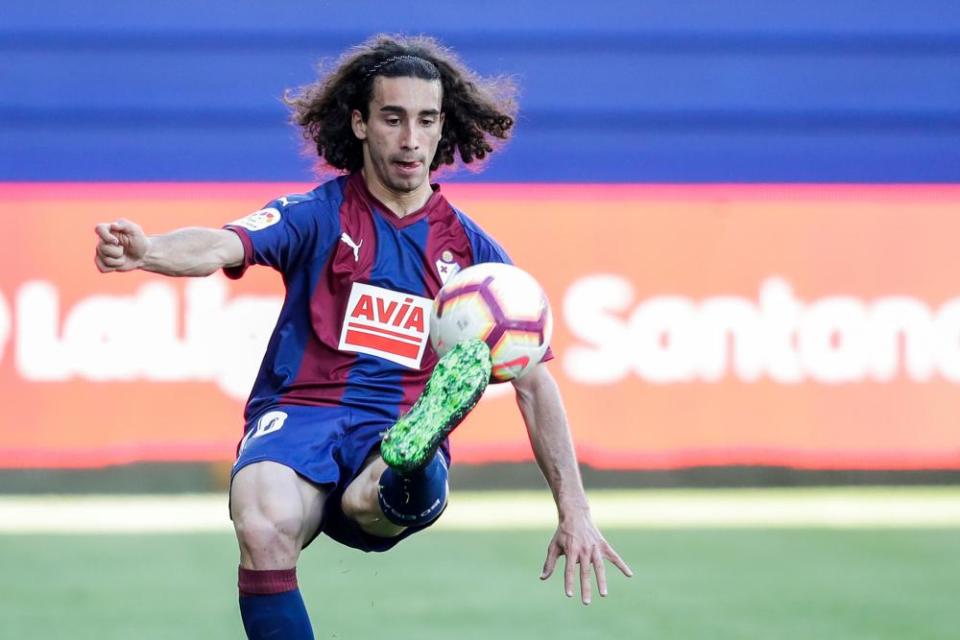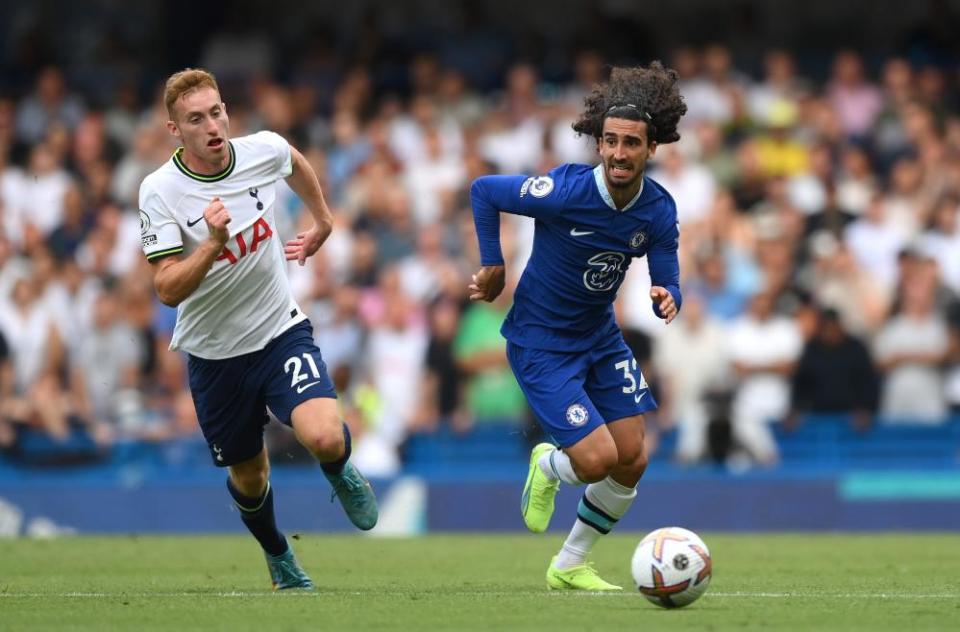‘A player with no ego’: why Chelsea’s Marc Cucurella is so effective

“He’s not quick, he’s not strong. All those things we measure with all those machines we have, he doesn’t register on any of them; you would never sign him,” José Luis Mendilibar said. “But he’s a footballer.”
It was autumn 2018 and the Eibar manager had been asked about the 20-year-old who had taken Real Madrid apart, providing the passes for all three goals in their first win against the European champions. His name was Marc Cucurella and the coach was right: most clubs would not sign him back then.
Related: Gus Poyet: ‘Young people cannot believe I played for Chelsea’
Eibar, though, are a model of sustainable overachievement and together with a triumph of talent and temperament – and the people Cucurella has allowed to mould him – opportunity has been seized at every assuredly taken step. “The first thing he had was daring,” says Fran Garagarza, the Eibar sporting director who saw something others did not. “We were the only primera team interested. I called and he was keen, very clear that was his chance to play in the first division, to progress. It was all very quick.”
Quick is the word: from no one interested, La Liga’s smallest club signing him on deadline day to Manchester City and Chelsea fighting over him in only four years, development measured in his increasing price every summer.
In 2018 Cucurella, who had been at Barcelona since he joined the youth squad in 2012, went to Eibar on loan. In 2019 Eibar paid €2m to buy him only for Barcelona to buy him back for €4m 16 days later and loan him to Getafe. In 2020 Getafe paid the €10m option. And in 2021 Brighton paid £15.4m. This month Chelsea spent £62m, making him the most expensive full-back in Premier League history.
“What he’s done is practically impossible,” says Rodri Tarín, now of Oviedo. “To go from an academy like Barcelona’s to clubs that are totally different, polar opposites, in consecutive summers and adapt is spectacular.
“You never know how good a player is until he’s competing, and every time Cucu’s stepped up he has carried on at exactly the same level, with the same personality. Which is why it wouldn’t surprise if he plays well at Chelsea.”
Tarín played alongside Cucurella in the Barcelona B defence. “Spontaneous, natural: a happy, relaxed guy who enjoys what he does and doesn’t worry excessively” in Tarín’s words, Cucurella made one first-team appearance in the cup but that lasted seven minutes and opportunities were limited.
There might not have been many more at Eibar: José Ángel Valdés, “Cote”, was first-choice left-back. In truth Cucurella was signed as backup. “With Cucurella’s age and level, we liked what we’d seen in Barcelona’s feeder team and thought it worth a go,” Garagarza says.

“We had identified him as a vertical, associative full-back who fits the manager’s high press although the formation and style was very different. He could get up and back, good in transition. He wasn’t a great crosser – more a good passer – but we had Cote who was, so didn’t mind. We signed him at the last minute, the season had started, the team was settled. We were OK with Cote; we needed another full- back with a different profile but [only] in case he got injured.” He did not but it did not matter.
Cote recalls: “He came young and I had the advantage: I’d been there two years, the manager knew me, trusted me. I was used to his system, which was to arrive on the outside and cross. It was hard for Marc to get a chance at full-back. But he’s so clever, so sharp, that Mendi saw he could play in any position.”
Garagarza remembers a discussion about Cucurella becoming a pivot but it was left midfield where he found a place. It began in Valladolid in week 12, only Cucurella’s second start, and it did not immediately go to plan, which speaks volumes.
“We get to half-time and Mendi has a right go at him,” Cote says. “He tells him everything he’s done is wrong, that he doesn’t want him so deep, so near to me. And he takes it all in, does what the manager says, goes out and is the best player. Forty five minutes were enough to understand.”
Garagarza insists: “Mendilibar and José Bordalás at Getafe are a big part of his development and there’s something very good about him: you press him, grab him and make demands of him, shout at him and he always takes it, sees it as a good thing.”
Tarín agrees: “That’s his greatest quality. He never takes a criticism personally, never feels attacked. He listens, corrects mistakes, understands.” The week after Valladolid, Cucurella took apart Madrid and never left the team again. The role was perfect, protecting him from some of the early defensive weaknesses Eibar had identified and providing a place to learn.
Tarín suggests he benefited from a position that was not so much pure winger as a hybrid role which meant continuing his defensive development and from the kind of experience and education-through-obligation not always available in a youth system at a giant club.
“In that sense, it’s vital to leave,” Tarín explains. “I see errors of my own from Barcelona B that seem unthinkable now; when you join a team like that – I went to Leganés, Cucu to Eibar then Getafe – every point is vital for survival and the adversity and the demands, the needs, are necessary to improve, to analyse every action, to see that mistakes just can’t happen.”

Garagarza admits: “We didn’t imagine he would be a winger, but it worked. He’s not a great goalscorer, hasn’t got a great shot, isn’t strong in the air, doesn’t have the body size for challenges but he has other things: he’s clever, he can pass, he’s daring, plays at high intensity with high repetition. He could combine, build overloads, offer a lot of continuity. He would come inside, between lines, into intermediate positions, recover the ball. He would win second balls when we went long to Sergi [Enrich], which we hadn’t anticipated. He hadn’t played that way before but he adapted, understood.
Related: Premier League: 10 things to look out for this weekend
“He’s a player with no ego. He came with the academic concepts from Barcelona but always evolved: at Getafe, for example, he learned that other football, how to manage a game; at Brighton he played at centre-back in a three although his main virtue isn’t in the air; at Chelsea, he’s taking dead balls, which he hadn’t. So will he succeed? Yes, yes, I’m absolutely sure of it.”
Cote says: “If you had asked me at Eibar if I could imagine him ending up where he is, I might have said no, but he’s such a good player and that year he exploded. He surprised us, but he’s clever, so clever, so alive.
“I only have good words to say. You ask him to do something and he does it, completely committed: that’s a joy for a coach. You tell him something and he just gets it. It happens naturally as if it’s easy.
“The intelligence defines him. The best players in the world have that and he has that. He plays, it’s all in his head. Before the ball arrives, he knows. Chelsea, City: that’s his level, and I’m so happy for him. That’s it, that’s the word: he’s a footballer.”

